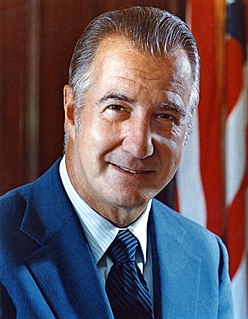A Quote by Hugo Black
The First Amendment's language leaves no room for inference that abridgments of speech and press can be made just because they are slight. That Amendment provides, in simple words, that "Congress shall make no law . . . abridging the freedom of speech, or of the press." I read "no law . . . abridging" to mean no law abridging.
Related Quotes
Because of the free speech clause in the First Amendment, which is very clear, "The government shall make no law abridging freedom of speech," and it literally is about political speech. You can say anything you want about politics, a candidate, and the government cannot stop you. And the Democrats hate that.
The Constitution, in addition to delegating certain enumerated powers to Congress, places whole areas outside the reach of Congress' regulatory authority. The First Amendment, for example, is fittingly celebrated for preventing Congress from "prohibiting the free exercise" of religion or "abridging the freedom of speech." The Second Amendment similarly appears to contain an express limitation on the government's authority.
The First and Fourteenth Amendments say that Congress and the States shall make "no law" which abridges freedom of speech or of the press. In order to sanction a system of censorship I would have to say that "no law" does not mean what it says, that "no law" is qualified to mean "some" laws. I cannot take this step.
The Framers of the First Amendment were not concerned with preventing government from abridging their freedom to speak about crops and cockfighting, or with protecting the expressive activity of topless dancers, which of late has found some shelter under the First Amendment. Rather, the Framers cherished unabridged freedom of political communication.
Our country as a whole, no less than the Hastings College of Law, values tolerance, cooperation, learning, and the amicable resolution of conflicts. But we seek to achieve those goals through "[a] confident pluralism that conduces to civil peace and advances democratic consensus-building," not by abridging First Amendment rights.
Religion should be subject to commonsense appraisal and rational review, as openly discussible as, say, politics, art and the weather. The First Amendment, we should recall, forbids Congress both from establishing laws designating a state religion and from abridging freedom of speech. There is no reason why we should shy away from speaking freely about religion, no reason why it should be thought impolite to debate it, especially when, as so often happens, religious folk bring it up on their own and try to impose it on others.
I think the reality is that copyright law has for a very long time been a tiny little part of American jurisprudence, far removed from traditional First Amendment jurisprudence, and that made sense before the Internet. Now there is an unavoidable link between First Amendment interests and the scope of copyright law. The legal system is recognizing for the first time the extraordinary expanse of copyright regulation and its regulation of ordinary free-speech activities.
This [anti-terrorism bill] is a violation of the First Amendment right to free speech and the Fourth Amendment protection of private property... Some of these provisions place more power in the hands of law enforcement than our Founding Fathers could have dreamt and severely compromises the civil liberties of law-abiding Americans. This bill, while crafted with good intentions, is rife with constitutional infringements I could not support.
Every time I criticize what I consider to be excesses or faults in the news business, I am accused of repression; and the leaders of the various media professional groups wave the First Amendment as they denounce me. That happens to be my amendment too. It guarantees my free speech as much as it does their freedom of the press.






























